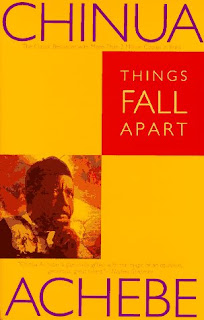From yesterday's Guardian article "Nigeria in mourning for Chinua Achebe:"
From Nobel laureates to roadside booksellers, Nigerians expressed their grief and shock at the death at 82 of Chinua Achebe, the literary giant whose works made him a household name and national hero. Many who had worked alongside him wept as they paid tribute, and bookstores in downtown Lagos said his books sold out as news of his death trickled in. Despite his age and distance from his homeland– he died in Boston, where he had lived for years – Achebe's frequent and often barbed pronouncements against an oil-fed Nigerian elite kept him very much in the national psyche. He further endeared himself to a younger generation of Nigerians weary of corruption, when he twice turned down a national honour in 2004 and 2011. African literature burst onto the world stage with Achebe's 1958 novel Things Fall Apart, which portrays an Igbo yam farmer's fatal struggle to come to terms with British colonialism in the late 19th century. It remains the best-selling novel ever written by an African author, having sold more than 10-million copies in 50 different languages. Nelson Mandela, who read his books during his 27-year incarceration, once said of him: "He was the writer in whose company the prison walls came down."Achebe is one of my top ten favorite authors. To understand who Achebe was and why he's so important, I recommend his most famous (and, IMHO, best) novel, Things Fall Apart:
Things Fall Apart tells two overlapping, intertwining stories, both of which center around Okonkwo, a “strong man” of an Ibo village in Nigeria. The first of these stories traces Okonkwo's fall from grace with the tribal world in which he lives, and in its classical purity of line and economical beauty it provides us with a powerful fable about the immemorial conflict between the individual and society. The second story, which is as modern as the first is ancient, and which elevates the book to a tragic plane, concerns the clash of cultures and the destruction of Okonkwo's world through the arrival of aggressive, proselytizing European missionaries.Those who liked Things Fall Apart might also enjoy the lesser-known Arrow of God:
The novel is set amongst the villages of the Igbo people in British Nigeria of the 1920s. Ezeulu is the chief priest of the god Ulu, worshipped by the six villages of Umuaro. The book begins with Ezeulu and Umuaro getting in a battle with a nearby village, Okperi. The conflict is abruptly resolved when T.K. Winterbottom, the British colonial overseer, intervenes. After the battle, a Christian missionary, John Goodcountry, arrives in Umuaro. When Goodcountry begins to tell the villages tales of Nigerians in the Niger Delta who abandoned their traditional "bad customs" in favor of Christianity, the conflict between Goodcountry and Ezeulu builds in a showdown that threatens to destroy their village.

No comments:
Post a Comment